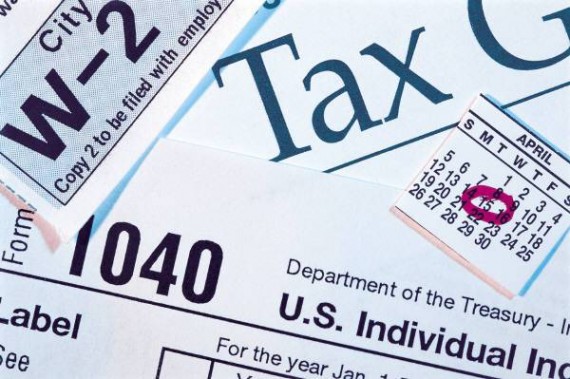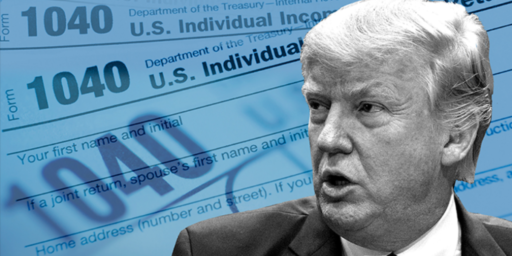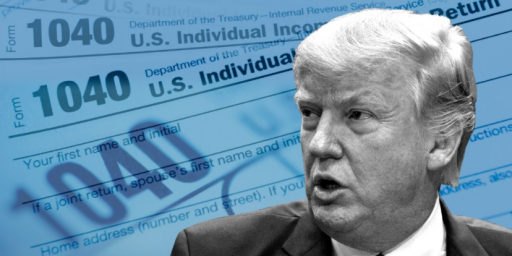IRS Considers Licensing Tax Preparers, Exempting Lawyers
The IRS wants to license tax preparers but exempt lawyers and CPAs from the requirement.
Institute for Justice attorney Dan Alban explains a bizarre ruling under consideration by the IRS:
Who would you rather prepare your taxes? A professional tax return preparer with over a dozen years experience in preparing tax returns for taxpayers without incident. Or me, an attorney who has never so much as taken a law school class or continuing legal education course in tax law, and gave up on doing his own taxes last year once he started needing to itemize his deductions. You probably think you’d prefer the first option, but the IRS says you’re wrong.
At a hearing that I am testifying at today, the IRS will consider adopting a sweeping licensing scheme that would place the careers of 700,000 tax preparers in jeopardy and likely harm over 87 million American taxpayers while benefiting a few politically-favored insiders.
Inexplicably, the proposed regulations exempt certain favored industry insiders. The IRS wants to exempt all attorneys and CPAs, regardless of whether individual attorneys and CPAs have any actual experience or qualifications in preparing tax returns.
But are most attorneys really that much better qualified to prepare your taxes? Absolutely not. Like me, most attorneys don’t have any special training or testing on tax law, let alone tax return preparation.
This is almost certainly bad policy but hardly inexplicable. Indeed, Dave Schuler has explained it dozens of times and as recently as Wednesday’s edition of OTB Radio: Lawyers write our laws. Once you understand that, it’s not difficult to figure out why laws are written to protect the interests of lawyers.
UPDATE: In comments, Alban assures me he was being “deliberately ironic” in using the word inexplicable.







Jim, there’s nothing bizarre about it. Lawyers and CPA’s have to pass exams and be registered. Anyone can set up shop as tax preparer. For years mine were done by a physics professor who was very good. Conversely, I had a secretary once who had hers done by a some charlatan who overcharged her and got her and her husband who was a self employed electrician into all sorts of trouble that my physics professor had to dig them out of. Most attorneys are reasonably sophisticated financially or at least I used to think so until Doug started giving us his views on the economic benefits of tunnel building so you may have a point.
If membership in the AICPA is any indication, there are more CPAs in industry than in the practice of public accounting, which includes tax preparation. So simply having a CPA license doesn’t mean you know anything about taxes.
The argument for exempting CPAs and attorneys is because of the already-in-place continuing education requirement, which, on the surface, makes some sense. What they should do is require some tax continuing education specifically.
My experience as a CPA and, before that, an IRS agent, tells me that there CPAs and attorneys who are capable tax preparers and some who aren’t, just like there are non-CPAs and attorneys who are capable tax preparers and some who aren’t.
Something has to be done to crack down on incompetent tax preparers. I’m not sure this is it, though.
No apologist for the IRS am I, but this story is simply not correct. And as an attorney in the process of registering as a return preparer, I’m pretty up on it right now.
The “exemption” being referred to is NOT from licensing. It’s only an exemption from the Continuing Ed requirement about to be imposed on licensed preparers. FWIW, the logic is that attorneys, accountants and enrolled agents already have their own CE requirements, so any tax preparation CE requirement would be duplicative.
Also FWIW, attorneys are required, under their legally binding ethics codes, not to practice in areas of law for which they are not qualified. So yes, you can graduate from law school not knowing a dang thing about tax preparation, but you can’t practice in the field without knowing the aforemention dang thing without exposing yourself to sanctions up to and including disbarment.
Again, All Hail Caveat Emptor! But the suggestion that there are more shyster lawyers bilking the gullible than there are shyster tax preparers is simply not reality-based.
P.S. Alban also displays his ignorance with:
“will preparers really be able to fully represent their clients’ best interests in a dispute with the IRS when concerned about the possibility of having their license revoked?”
Preparers COULD NOT BEFORE AND CANNOT NOW represent clients before the IRS. Only enrolled agents and attorneys can. The licensing requirement is irrelevant in that repsect. Just saying.
Vivian J Paige says:
Saturday, October 9, 2010 at 08:49
“If membership in the AICPA is any indication, there are more CPAs in industry than in the practice of public accounting, which includes tax preparation”
I’ve no doubt this is true and equally that there are competent and incompetent lawyers and CPA’s preparing tax returns. But the same could be said of surgery or physical therapy. No system is ever going to exclude all qualified incompetents but on the basis that it’s better to light a candle than curse the dark, some system of licensing hardly sounds revolutionary. When it comes to handling people’s financial affairs you don’t get much lower on the totem pole than realtors and even they have to be licensed.
KipEsquire says:
CPAs also can represent clients before the IRS.
And you are correct on this being an exemption from the continuing education requirement.
And @Brummagem Joe – I agree that no system can exclude all incompetents. Of course, if the IRS required continuing education of all, that would reduce the the number of incompetents. I also know it’s not going to happen.
Yes, my use of the word “inexplicably” was deliberately ironic. There is an explanation for the exemption, of course, but the reason for the exemption is not a very legitimate one.
There are already exisiting civil and criminal penalties for tax return preparers who improperly file tax returns or otherwise engage in misconduct. 26 U.S.C. 6694, for example, imposes a minimum $1,000 penalty on any preparer who understates a taxpayer’s liability due to an “unreasonable position” and a minimum $5,000 penalty on any preparer who does so willfully or recklessly.
KipEsquire seems to be confusing the new requirement that every tax return preparer obtain a TPIN with the proposed licensing scheme at issue in my op-ed. The licensing scheme I discuss is still a proposed regulation and is not yet current law. Thus, while it is true that all tax return preparers must now obtain a TPIN, KipEsquire is most certainly not already in the process of registering as a “registered tax return preparer” under Proposed 31 C.F.R. 10.4(c) and 10.3(f). The regulation doesn’t even exist yet, and even if it did, he would be exempt as an attorney.
Although I didn’t have room to go into the details due to space constraints, the licensing scheme at issue in my op-ed is the imposition of both an examination requirement and a continuing education requirement on all tax return preparers that are not either an attorney, a CPA , or already an “enrolled agent” (an enhanced status with the IRS which already has its own testing and CE requirements.) In order to prepare someone else’s taxes under the proposed licensing scheme, you must at least be a “registered tax return preparer” that has passed the licensing exam and you must meet the annual continuing education requirement. This is a sweeping new requirement that does not exist under current law.
Attorneys and CPAs are exempt from these requirements even though they may have no special training or expertise in tax preparation. Not all CPAs do taxes, and most lawyers aren’t tax lawyers. There is no reason to think that attorneys have any sort of equivalent testing or CE requirements. Not all attorneys have to take a bar exam in order to become member of the bar (Wisconsin and, to a limited extent, New Hampshire, have diploma privileges for in-state law schools). The Multistate Bar Exam does not test tax issues, and whether tax is even a subject for possible testing on the state portion of the exam is up to each state bar. Many states do not have continuing education requirements and even in those that do, few attorneys who do not practice tax law would take CLE courses on tax issues.
With respect to the conflict of interest, I was discussing the general problem of representing a client’s best interests in any situation in which a decision about how to prepare a client’s tax return might lead to a tax dispute with the IRS, not necessarily an instance of a tax preparer directly representing a taxpayer to an IRS agent. Nonetheless, contrary to KipEsquire’s contention, tax return preparers may in fact represent taxpayers in some circumstances under what is known as limited representation. See 31 C.F.R. 10.7(c)(viii):
“An individual who prepares and signs a taxpayer’s tax return as the preparer, or who prepares a tax return but is not required (by the instructions to the tax return or regulations) to sign the tax return, may represent the taxpayer before revenue agents, customer service representatives or similar officers and employees of the Internal Revenue Service during an examination of the taxable year or period covered by that tax return, but, unless otherwise prescribed by regulation or notice, this right does not permit such individual to represent the taxpayer, regardless of the circumstances requiring representation, before appeals officers, revenue officers, Counsel or similar officers or employees of the Internal Revenue Service or the Department of Treasury. “